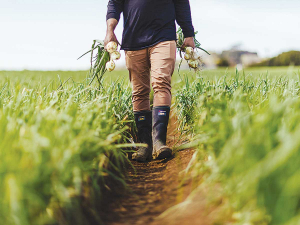Record Kiwifruit Crop 2025-26: Zespri Forecasts Highest Grower Returns
Good news for kiwifruit growers - a record crop with forecast per hectare returns at record levels for all fruit categories for the 2025-26 season.
 T&G Global and Zespri – are teaming up with Plant & Food Research on a new project investigating regenerative horticulture.
T&G Global and Zespri – are teaming up with Plant & Food Research on a new project investigating regenerative horticulture.
Two of New Zealand’s largest horticultural businesses – T&G Global and Zespri – are teaming up with science organisation Plant & Food Research on a new project investigating regenerative horticulture.
It will look into researching, developing, defining and promoting sustainable regenerative horticulture practices within the kiwifruit, apple and berry industries. Plant & Food believes the project has the potential to be one of the most extensive horticultural research programmes in NZ. It is partially funded through the Ministry for Primary Industries’ (MPI) Sustainable Food and Fibre Futures Fund.
The first part of the project will involve an exploration of regenerative practices and market analysis. The goal of this will be to move to a longer-term programme of research – including scientific and market validation – along with the implementation of science and grower-backed practices in regenerative horticulture.
T&G Global’s Gareth Edgecombe says the project is hugely exciting for the industry.
“For generations, we’ve grown premium, healthy fresh produce for consumers around the world, evolving our practices as our knowledge grows and consumer needs change,” he explains
“With consumers and businesses alike seeking to consume and produce food that improves, enhances and supports the environment in which we grow in, we, together with Zespri and Plant & Food Research, want to validate and advance regenerative horticultural practices in NZ.”
Edgecombe says while a lot of global research has gone into regenerative agricultural practices, the same can’t be said for horticulture. He add that the sector is heavily nuanced and relies on continual research and innovation into growing practices, pest and disease management, and on orchard management practices.
Zespri’s Rachel Depree says the kiwifruit marketer has a strong commitment to sustainable practice. She believes this project represents an opportunity to explore what the regenerative horticulture concept could mean for the NZ kiwifruit industry.
“Our market research also indicates consumers are increasingly interested in the idea of regeneration,” Depree explains.
“It’s important we understand how these practices link to this emerging concept of regenerative horticulture and what value there is in this for our consumers and our growers.”
The first year of the project is currently underway and focused on conducting scientific research on what is known about regenerative practices.
In parallel, market analysis will be undertaken to understand consumer perceptions and drivers. This will include working with iwi and growers to collaborate and build a widely agreed definition of regenerative horticulture for the industry.
Plant & Food Research’s Dr Brent Clothier says regenerative agriculture means different things to different people and it’s important to put any global principles into a New Zealand context.
“In general, our growers are well connected to what their land needs to produce high yields and high quality,” he adds. “For NZ, regenerative horticulture is also about better engagement with workers, linking with communities, and the principles of Te Taiao and the mātauranga that underpins it.”
Clothier says if the NZ hort sector wants to remain competitive in the global marketplace, it’s important it uses scientific analysis to quantify the impact of our horticultural practices on the land and soil health in the long term.
“We must align our practices and our reporting with what the consumer expects from our premium produce.”
Dairy Women's Network (DWN) has announced that Taranaki dairy farmer Nicola Bryant will join its Trust Board as an Associate Trustee.
Rural Women New Zealand (RWNZ) says it welcomes the release of a new report into pay equity.
Red meat exports to key quota markets enjoyed $1.4 billion in tariff savings in the 2024-25 financial year.
Remediation NZ (RNZ) has been fined more than $71,000 for discharging offensive odours described by neighbours as smelling like ‘faecal and pig effluent’ from its compositing site near Uruti in North Taranaki.
Two kiwifruit orchards in the Bay of Plenty and one in Northland are this year's finalists for the Ahuwhenua Trophy competition.

OPINION: A mate of yours truly reckons rural Manawatu families are the latest to suffer under what he calls the…
OPINION: If old Winston Peters thinks building trade relations with new nations, such as India, isn't a necessary investment in…